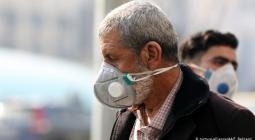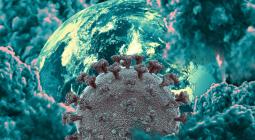What Science Has to Say About the Coronavirus — Climate Crisis Connection. A Press Review.
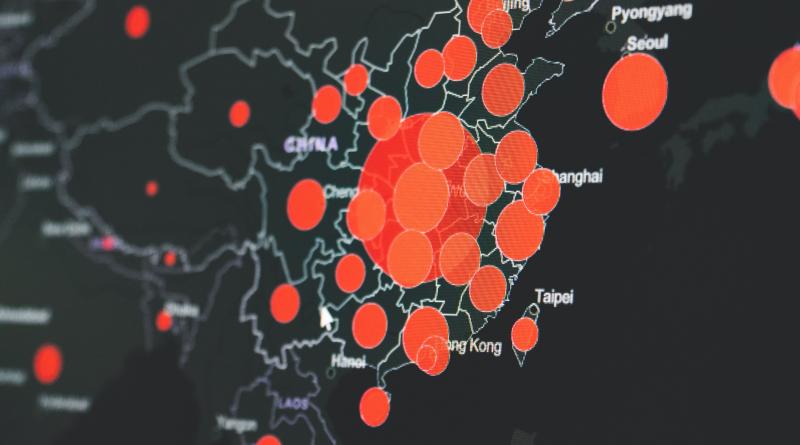
Understanding how Covid-19 is affecting the climate crisis is of vital importance. There are a variety of narratives emerging across global media channels, with many left wondering if the current health crisis can be transformed into an opportunity to shape a more sustainable world. Here is a comprehensive press review, drawing on sources that are backed up by scientific research and addressing Covid-19’s role as a catalyst or inhibitor of climate change.
To begin with, it is important to understand the origins of the coronavirus (Covid-19) and dispel some misconceptions about how it developed. The video below, produced by VOX.com, provides a thorough explanation of how the virus developed using effective visual aids and a factual approach. By drawing on reliable sources of information, such as the peer-reviewed paper published in Nature, The proximal origin of SARS-CoV-2, it gives an overview of the most notable features of the SARS-CoV-2 genome and how it has arisen. A fundamental pre-requisite for understanding the virus’ potential role in shaping our environment.
Is climate change the cause behind Covid-19?
Although there is an abundance of research and articles, that link the spread and development of new diseases and viruses to rising global average temperatures, claiming that climate change is the cause of the Covid-19 pandemic is not accurate.
Climate scientist, Professor Katharine Hayhoe, addresses this issue in a series of tweets. “What does Covid-19 have to do with climate change? The short answer is, very little; but the long answer is, everything is related…”
Professor Hayhoe explains that, although “some diseases, such as Zika, are spread by animals like mosquitoes and ticks, and can be expected to spread as a warming world expands the animals’ geographic range. But it’s humans who transmit COVID-19. And we’re already everywhere. So climate change is not significantly affecting the spread of the disease. That one’s on us. It goes where we go.”
On the other hand, a WWF article addresses the effect of biodiversity loss on the spread of pandemics, implying that the spread of new diseases such as Ebola, AIDS, and SARS is directly affected by the destruction of natural ecosystems. In particular, the article points to the commerce of legal and illegal wildlife (both live and in parts) as the most probable source of the virus (as explained in the Vox video above.) Therefore, although rising global average temperatures aren’t directly to blame, man’s destruction of natural habitats, the creation of artificial ones, and wildlife trade have enabled numerous of the emerging infectious diseases which we see spreading today. In summary, as we worsen the climate crisis by destroying biodiversity and natural habitats we also facilitate the emergence and spread of new diseases.
Does air pollution make Covid-19’s repercussions on human health worse?
Preliminary studies indicate that there could be a correlation between pollution and mortality rates for Covid-19 patients. In fact, air pollution is proven to make people more susceptible to respiratory illness. A look at the past SARS epidemic in China found that patients from regions with high air pollution were “twice as likely to die from SARS” compared to patients from regions with cleaner air.
Returning to the tweets of Professor Hayhoe, climate change can, therefore, be considered a “threat multiplier” that makes many of our problems worse. An article in the Italian daily, Il Sole 24 Ore, gives a detailed analysis of the effects of high Pm10 concentrations (very small particles found in dust and smoke) on the spread of the virus. The article provides preliminary data that identifies a correlation between above-legal levels of Pm10 and the total number of Covid-19 infections. “The more pollution there is the more we create motorways for contagion. We must reduce emissions as much as possible,” claims Gianluigi de Gennaro, from the Università di Bari.
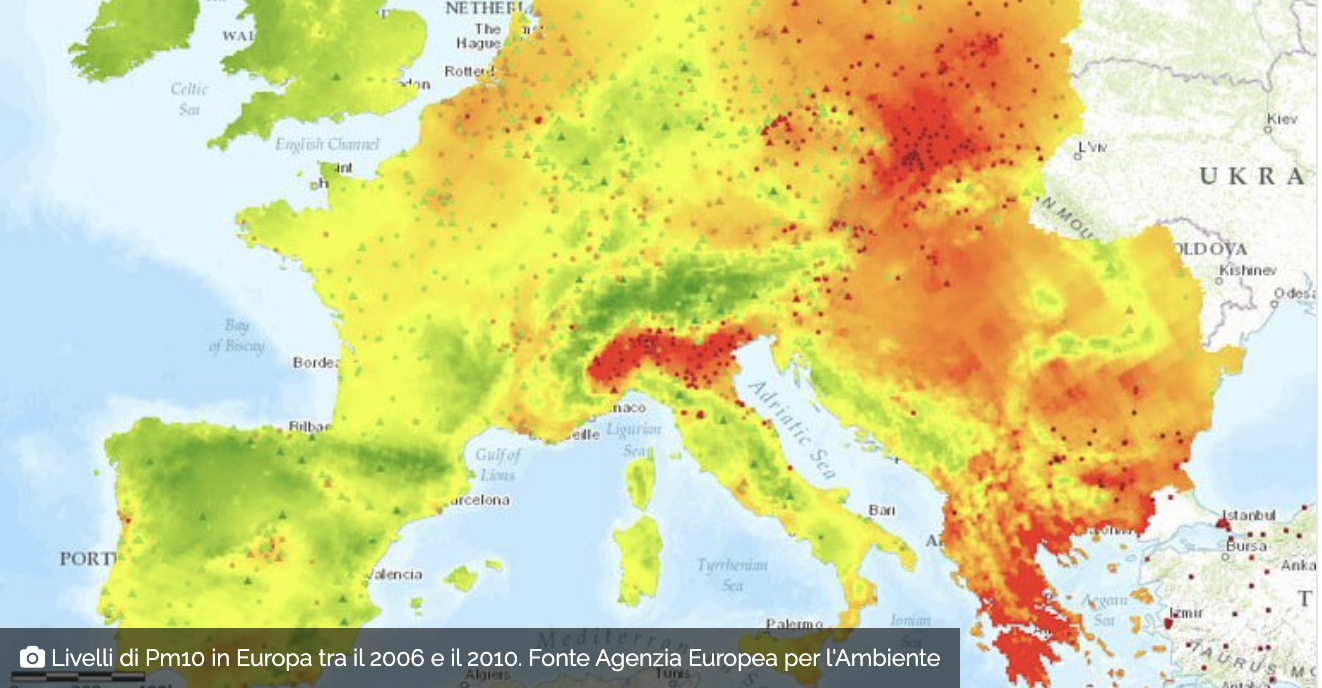
The preliminary data suggests that the current climate crisis has had an enabling effect on both the spread and impact of Covid-19. However, what is also interesting is the emerging discussion on the effect of Covid-19 on the climate crisis itself.
Can Covid-19 lead to positive environmental repercussions?
One of the most common claims circulating on global media has been that Covid-19 has led to a sharp decrease in harmful emissions, particularly in countries that have gone into lockdown (such as China and Italy). The New York Times published a revealing article that discusses NASA’s satellite imagery showing “striking reductions in pollution across China and Italy since the outbreak first started.”
“We’re seeing changes in human behavior, in how people are moving around and how they’re using fuels. Pollution won’t hide from the satellite data. It’s going to tell us what’s going on.”
This was also echoed by other leading newspapers such as The Guardian, which echoes the claim by stating that: Covid-19 could lead to a fall in global CO2 emissions. Similarly, the BBC declares that “Levels of air pollutants and warming gases over some cities and regions are showing significant drops as coronavirus impacts work and travel.”
What is certain, and highlighted by the Centre for International Climate Research is that “There is a strong link between economic activity and global carbon dioxide emissions, due to the dominance of fossil fuel sources of energy. This coupling suggests we might be in for an unexpected surprise due to the coronavirus pandemic: a slowdown of carbon dioxide emissions due to reduced energy consumption.”
China and Italy on lockdown
The two worst-affected countries to date have been China and Italy. The European Space Agency released the video below to highlight new data from the Copernicus Sentinel-5P satellite, which reveals a decline in air pollution, specifically nitrogen dioxide emissions, over Italy in the last few weeks.
Similarly, Carbon Brief gives a detailed analysis of falling CO2 emissions in China since the outbreak of Covid-19, suggesting there has been a 25% drop in energy use and emissions in China over a two week period. This has the potential to bring an overall fall of about 1% in China’s carbon emissions this year: “All told, the measures to contain coronavirus have resulted in reductions of 15% to 40% in output across key industrial sectors. This is likely to have wiped out a quarter or more of the country’s CO2 emissions over the past four weeks, the period when activity would normally have resumed after the Chinese new year holiday. (See image below.)”
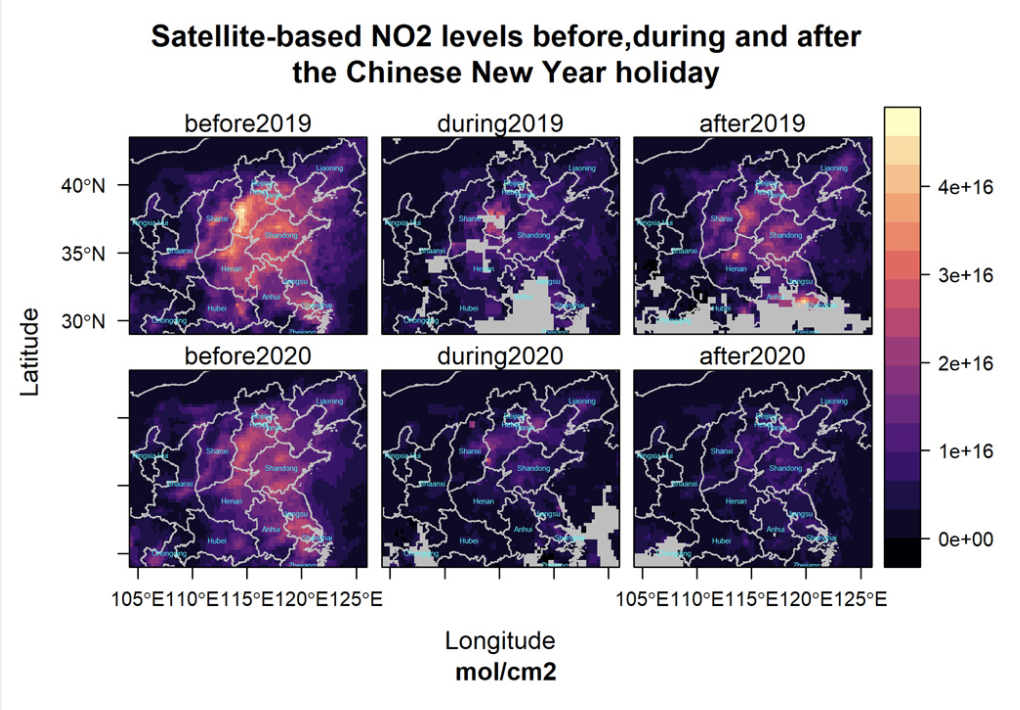
What about the long term effects?
In contrast, some are concerned about what the future effects of Covid-19 will be and how the virus will impact environmental policy and investments. In particular there is an emerging narrative that sees the current reductions in harmful emissions simply as short terms consequences of policy aimed at containing the virus and that these will in no way affect long term CO2 emission patterns. Time magazine writes that Covid-19 will delay climate meetings and summits as well as distracting global leaders from making big commitments to reducing emissions: “Bold climate plans require spending political capital, and world leaders are likely to want to use their political energy to boost the economy in response to coronavirus.”
A position that is also put forward in an article published in Nature: A year without conferences? How the coronavirus pandemic could change research. Meetings and conferences on climate change in March and April have already been canceled by the UNFCCC and many more will probably face the same outcome due to travel restrictions and social distancing measures, leading to significant setbacks in both climate change policy development and research.
There is already talk about the EU Green New Deal facing significant delays, as the EU legislative process cannot operate at full capacity and priority is being given to measures to address the Covid-19 crisis. Furthermore, there is a worry that developing nations’ ability to design new climate plans before COP26 summit in November in Glasgow will also face setbacks, not to mention the possibility of the conference being delayed or canceled altogether.
Furthermore, in terms of investments, there is growing concern with regards to what Covid-19 will do to the global economy and how this will affect capital flows towards green investments.
The economics of a pandemic
Not only has Covid-19 brought an almost unprecedented slump in global markets, according to Fortune Magazine it has also led to a price war on oil.
The New York Times reports that slashing oil costs usually leads to a rise in greenhouse gas emissions, as people use more oil and disregard alternatives like electric cars. Echoing these claims, Fatih Birol, the head of the International Energy Agency, has also warned that cheap oil may slow the transition to cleaner energy worldwide. This is because low oil prices usually lead to more travel, more production, and more harmful emissions.
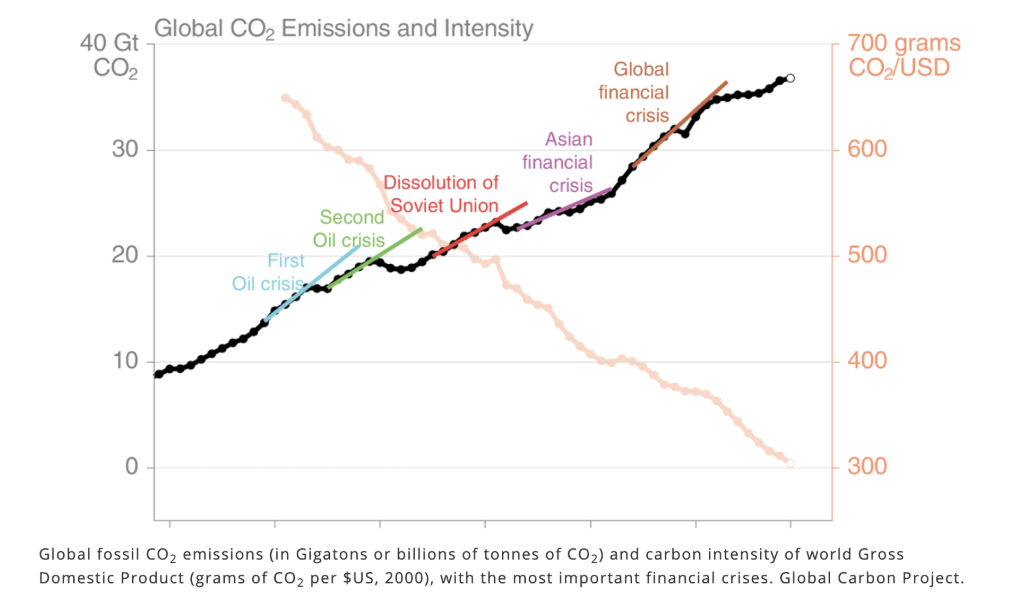
However, Fatih Birol is also positive and claims that it appears unlikely that this will happen this time around. More and more countries are restricting the movement of people in efforts to stop the spread of the virus and consequently lowering their energy use and productive rates.
In fact, the IEA released a statement entitled “Global oil demand to decline in 2020 as coronavirus weighs heavily on markets.” The uncertainty surrounding oil could actually lead some companies to decide that renewable sources like wind and solar are a safer investment in a world of unstable oil prices. A position that is expanded upon in the Reuters article: Climate fight will survive dual oil and virus blow.
Furthermore, the International Renewable Energy Agency goes as far as to state that: “Oil market volatility is unlikely to have a significant impact on renewable energy plans and investments […] Conversely, oil price volatility may undermine the viability of unconventional oil and gas resources as well as long-term contracts, providing a window of opportunity to reduce or redirect fossil fuel subsidies towards clean energy, while minimizing the potential for social disruption.”
The conversation picks up on this thread: “The coronavirus pandemic will not turn around the long-term upward trend in global emissions. But governments around the world are announcing economic stimulus measures, and the way they’re spent may affect how emissions evolve in future.”
In this regard the economics of the coronavirus pandemic lead to the following questions: will Covid-19 open a window of opportunity to shape a more sustainable world when the economy revives?
In the words of Former Executive Secretary UN Climate Change Convention, Christiana Figueres: “We have a massive crisis = opportunity on our hands. We cannot afford to waste it. Recovery must be green.”
Can lowering contagion rates help lower emissions?
One of the main tools being used to fight the pandemic has been social distancing. But what effect does this have on the environment?
A preliminary working paper, with authors from Bocconi University in Milan — GREEN and the CMCC Foundation — RFF-CMCC European Institute on Economics and the Environment (EIEE), indicates that social distancing may actually lead to positive effects on the environment. The paper is careful to state that there is only preliminary evidence that social distancing may have a positive impact: “Researchers have started to look into the numbers that are now available (though we are far from a definitive picture) on the implications of voluntary and imposed social distancing measures to fight COVID-19 and its potential impact on pollution. Results look different depending on the pollutants considered and may have overall positive environmental effects.”
When commenting on the paper, co-author Valentina Bosetti explains that: “The results are still preliminary but they show us that we will learn a lot by monitoring the heterogeneous impacts across countries of these measures.”
And solutions to Covid-19 are not only limited to social distancing. An article published on FastCompany.com highlights the benefits of acting on climate change in the same manner in which we are acting to contain the current pandemic.
“We’ve seen that governments can act, and people can change their behavior, in a very short amount of time. And that’s exactly what the climate movement has been asking governments and people to do for years in the face of a different kind of threat — the climate crisis — and we don’t see commensurate action. On the one hand, it shows that it’s possible to do this, and it’s possible for this kind of mobilization of resources to take place in a short amount of time. In that sense, that’s encouraging. But we were never in doubt of that aspect.” says May Boeve, executive director of the climate advocacy group 350.org on FastCompany.com.
Science is the solution
“Alarming levels of inaction” said the WHO’s Director-General on Wednesday about the global response to Coronavirus. He could very well have been talking about the climate crisis. As the pandemic grows entrenched and affects all corners of the globe there are many lessons to be learned with regards to climate change and how we are tackling it.
As pointed out in Science magazine, “both [Covid-19 and climate change] are existential challenges [and anyone] who belittles and neglects science has made them tougher to address”. As science becomes the main motivator in actions to contain Covid-19 it is evident that we must also turn to science if we are to tackle the climate crisis effectively. Will the coronavirus pandemic, which has killed more than 10,000 people worldwide, open a window of opportunity to shape a more sustainable world when the economy revives? Will this transition be based on scientific knowledge? These are the questions being asked by media outlets across the globe.
* Read the original article here
23 March 2020
Medium


